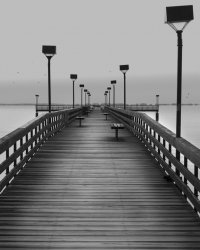I have been looking at the DSLR scene for a while. I have a Nikon N70 that uses the old fashioned celluloid stuff. My wife has a Canon Rebel, also film-based. We're probably going to buy a DSLR next year when our budget will allow for it.
I have been watching mainly what Canon and Nikon have been putting out for some time. It seems like both companies are heading toward a full-frame sensor now that Nikon announced just that in their D3. If that size sensor moves into the full line-up, it seems like DX lenses could end up being a liability down the line. What do you think?
I have been watching mainly what Canon and Nikon have been putting out for some time. It seems like both companies are heading toward a full-frame sensor now that Nikon announced just that in their D3. If that size sensor moves into the full line-up, it seems like DX lenses could end up being a liability down the line. What do you think?


